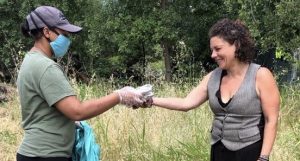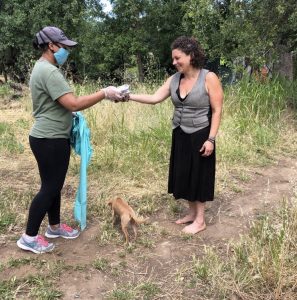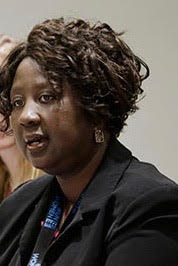by Lindajoy Fenley and Leslie Layton
Alexandra Wynter is feeling optimistic – even in the middle of a global pandemic that has made a difficult life even more difficult for many women.

As a volunteer coordinator for an outreach program run by Chico’s DSA (Democratic Socialists of America), the pandemic has given her an opportunity to build relationships with unhoused women — she prefers “unhoused” to the stigma attached to “homeless” — throughout the community whose lives have been made even more precarious by the COVID-19 crisis.
“I’m out there every day,” Wynter told ChicoSol. “We’ve been able to build a sense of trust. I’m actually really excited about the possibilities of establishing a permanent outreach team and a campground.”
That kind of effort, she said, could eventually help get some 300 unhoused people into a safer and more sanitary environment where they would have access to services.
Women have always borne the brunt of disruption during major crises, according to the experts who addressed reporters last week during an Ethnic Media Services online briefing, “The Shadow Pandemic,” on COVID 19’s impact on women.
But they also pointed out something that reflects Wynter’s optimism: past crises, like the 1918 Spanish flu pandemic and the Great Depression, presented the context for movements that led to more opportunity for women and a fight against other inequities.
The economic toll
A short time ago, women could celebrate achievements such as their larger role in the workforce.
Those gains are now shriveling due to the economic fallout of a global health crisis as women lose jobs, take on additional care-giving activities and school their children.

“Just a couple of months ago, we were celebrating the gains that women had made in the U.S. in the workforce,” said C. Nicole Mason, president and CEO of the Institute for Women’s Policy Research. “At the time, they were about 51% of the labor force. Women now, because of high unemployment, make up about 47% of individuals in the workforce.”
Mason also noted that the current unemployment rate for women is about 15%, up from 3.5% a month and a half ago.
Speakers agreed that even once recovery begins, the overall burden women carry will remain, particularly economically. Many jobs in the service and tourism sectors will not come back; many day care businesses will not reopen; and wage inequality will remain, Mason said.
Violence increases, and locally, signs that abuse has intensified
Beatrice Duncan, policy adviser for United Nations Women, said that globally there has been a threefold spike in the incidence of domestic violence cases – cases that can involve violence from adult children as well as from intimate partners.
Wynter has glimpsed this worsening problem locally. The shelter-in-place policy has reduced the mobility of unhoused women, who can become trapped with abusive partners while people are discouraged or even prohibited from setting up new homeless encampments.

In Butte County, Anastacia Snyer, executive director of Catalyst Domestic Violence Services, said the problem has become evident not by an increase in calls to the shelter’s hotline, but rather by calls suggesting greater-than-usual trauma.
“The calls we are getting [indicate] the intensity of the trauma is increasing,” Snyder told ChicoSol in a telephone interview. In addition, Snyder said, the number of calls to the hotline ending with abrupt hang ups is on the rise.
“We know that means people don’t feel safe,” Snyder explained, adding that the hang ups indicate domestic violence victims “don’t have the capacity to not be in the same space as the person causing harm.”
Mimi Lind, director of behavioral health and domestic violence at the Venice Family Clinic in Southern California, indicated that what Butte County has experienced is typical. Speaking at the briefing, Lind said the perpetrator may be sitting next to a woman who wants to call, or he may tell her to keep her phone on speaker so he can listen in.
While Catalyst has had to temporarily close its drop-in centers where in-person assistance is provided, it has maintained a hotline where calls are answered and even therapy can be provided. Snyder said Catalyst is also providing shelter at multiple locations for domestic violence victims who need to flee abusers.
Because this is the third major crisis to hit this region in a short time – the pandemic follows the 2017 Oroville Dam spillway evacuation and the 2018 Camp Fire – Snyder said she now knows that demand for services is likely to soar later in the year or once pandemic restrictions are eased.
“I anticipate it will get really intense once people begin transitioning back to a normal way of functioning,” Snyder said. “That’s when we think our calls will increase — when things open up and people go back to work and school.”
The link between abuse in the home and unemployment is nothing new, Lind said, referring to a UCLA study from years ago that linked the incidence of domestic violence with unemployment.

Duncan noted that globally, the pandemic has created 144,000 widows. In those cases, she explained, women might have to become breadwinners overnight in a world where there are fewer jobs or, in some African or Asian countries where women don’t have the right to inherit property, they may become the property of their husband’s next of kin.
An opportunity for change in Chico and elsewhere
Wynter said that soon after an unhoused community member tested positive for COVID-19, her group – there have been some 50 volunteers working with DSA – was funded by the True North Housing Alliance to do what she calls “overall city outreach.” They quickly set up what they call a mutual aid network that reaches both housed and unhoused people with food deliveries and other needs.
The volunteers began shopping, preparing and delivering some 100 meals and some snacks on a daily basis to high-risk residents in the area, as well as 5-gallon jugs of water. As they worked, they received requests for not only tents and tarps, but sanitary products as well needed by unhoused women who were menstruating or going through menopause.
Now, with the help of data that DSA has been able to provide, the city is considering establishing a permanent outreach team, Wynter said, and looking at how much would be needed, in terms of space and funding, to create a campground that could help unhoused people avoid street sleeping.
This kind of grass-roots work is going on in other cities, too, she said.
“Change that produces equity happens because of organized activism…” — Swinth
Women carried the heaviest loads during the 1918 pandemic and the Depression of the 1930s, Fordham University history professor Kirsten Swinth said at the briefing, but those crises offered opportunity; the past provides lessons for the present.
Homemakers led a nationwide uprising against the high cost of living that included consumer boycotts, anti-eviction protests, rent strikes and protests for better education. Women organized large-scale barter organizations where people traded food for labor, she said.
The pandemic that occurred a century ago opened the door to more nursing schools, upgraded professional standards and desegregation of the Army nurse corps. A little over a decade later, when women endured high unemployment during the Depression, female union membership increased 300%, she added.
“I think that it’s possible that valorizing nurses and female essential workers could be leveraged to advance crucial aims of better pay and improved working conditions in caring professions,” she said.
“I think that fears from getting sick on the job, along with their anger at terrible pay, may bolster unionization for frontline, low-paid service workers where women predominate. We are already seeing calls for organizing rent strikes, campaigns for affordable housing and other ways to reduce the cost of living, as well as barter networks that parallel those of the 1930s.”
However, she cautioned, “Nothing happens automatically.”
Said Swinth: “Crises in and of themselves don’t lead to greater change or advancement for women’s equity. Rather, change that produces equity happens because of organized activism in response to gaping inadequacies of the system that crises expose.”
Lindajoy Fenley is a contributing editor to ChicoSol, and Leslie Layton is editor.
To donate to the DSA’s mutual aid program, go here. To volunteer, here.
